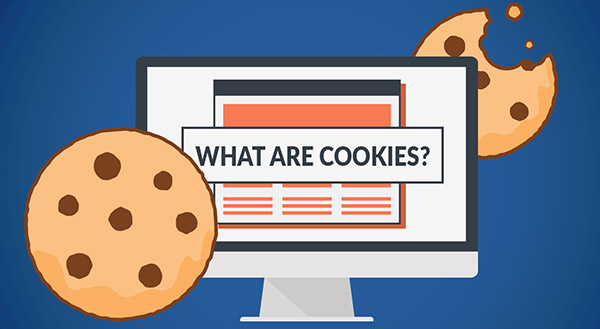
Intro:- What are Cookies on Website? Cookies are small pieces of text sent to your browser by a website you visit. They help that website remember information about your visit, which can both make it easier to visit the site again and make the site more useful to you.
Session cookies: A session cookie helps a website track a user’s session cookies are deleted after a user’s session ends — once they log out of their account on a website or exit the website. Session cookies have no expiration date, which signifies to the browser that should be deleted once the session is over.

Cookies help inform websites about the user, enabling the websites to personalize the user experience. For example, eCommerce websites use cookies to know what merchandise users have placed in their shopping carts. In addition, some cookies are necessary for security purposes, such as authentication cookies.
About:- Cookies are small files of information that a web server generates and sends to a web browser. Web browsers store the cookies they receive for a predetermined period of time, or for the length of a user’s session on a website. They attach the relevant cookies to any future requests the user makes to the web server.
The cookies that are used on the Internet are also called “HTTP cookies.” Like much of the web, cookies are sent using the HTTP protocol.
What are Cookies on Website? If you are reading this article that means you want to know about what are cookies on websites, right? But, you don’t have any idea how or where to know. If you are looking for an easy guide on what are cookies on websites then you are at the right place. Just you have to read this article properly. In this article, I will show a proper guide on what are cookies on websites. Even if you are a beginner is no worry about it. The steps below are for both Beginners & Experts.
But before beginning to start an article, there are some major points that you should know, like(FAQs)
- What are cookies?
- How are cookies used?
- Should I accept cookies on a website?
- Are cookies safe?
- Do cookies track you?
Let's Find Out. ...
1. What are cookies?
Cookies are small files sent to your browser from websites you visit. These files then track and monitor the sites you visit and the items you click on these pages.
2. How are cookies used?
Cookies remember the products you have clicked on, the locations you have checked frequently, the types of stories you are interested in, and even your information. They create a personalized internet experience to streamline your searches.
3. Should I accept cookies on a website?
It’s a good idea to decline third-party cookies. If you don’t decline, the website could sell your browsing data to third parties. Sharing your personal information with third parties without giving you any control over it could also leave you vulnerable.
4. Are cookies safe?
“Cookies are inherently harmless,” Steinberg says. “They are not a form of malware.” Brooks agrees. “Generally, cookies are safe and a part of the user experience,” he says. “They are certainly useful for password or authentication purposes, and for storing your website preferences.”
5. Do cookies track you?
Yes, some cookies track the IP addresses of users when they visit a website. The use of such tracking cookies is regulated in most parts of the world, and under the EU’s GDPR, California’s CCPA/CPRA, Brazil’s LGPD, and South Africa’s POPIA, IP addresses are considered personal data/information.
Let's Explore That. ...
What are cookies on Websites?

Website Cookies
Website cookies, also known as HTTP cookies, are a necessary function for the modern internet. As a fundamental part of website browsing, website cookies help organizations deliver a personalized and convenient experience to the user. These cookies allow websites to remember you, your logins, shopping carts, and more.
Specifically, cookies are small text files with pieces of data that websites send to your browser/device, like login information, which are used to monitor and identify you. Websites use cookie consent banners to provide transparency to visitors about how they use and collect user data.
How are Website Cookies used?
For example, if a user goes online to check the weather, the website or app will require them to type in their zip code. Because of website cookies, the next time that user goes back to the website or app, it will remember their zip code. However, there are differences in the types of cookies being used as well as cookie compliance requirements.
Types of Cookies
The biggest differentiator in cookies is first- and third-party cookies. While they’re both used to track user behavior and have similar purposes, they are used and collected in different ways.
First-Party Cookies
First-Party Cookies are directly stored by the websites (or domains) a user visits. These cookies allow website owners to collect analytics data, remember language settings, and perform other useful functions that provide a good user experience. For example, first-party cookies allow users to add multiple items to their carts on e-commerce websites. Also called session cookies, without them websites wouldn’t be able to recognize a user’s past activities and their cart would always be empty.
Third-Party Cookies
Third-Party Cookies are created by domains that are not the website (or domains) that you are visiting. Typically, these are used for online advertising purposes and are placed on a website through a script or tag. A third-party cookie is accessible on any website that loads the third-party server’s code.
Also called a persistent cookie which is used to create a convenient and faster website experience. They have an expiration date issued to them by the web server. Basically, persistent cookies track visitors as they move around the website to figure out what users like and help improve their experience. The most popular persistent cookie is a Google Analytics cookie.
Clear, enable, and manage cookies in Chrome
You can choose to delete existing cookies, allow or block all cookies, and set preferences for certain websites.
What cookies are
Cookies are files created by websites you visit. They make your online experience easier by saving browsing information. With cookies, sites can keep you signed in, remember your site preferences, and give you locally relevant content.
There are two types of cookies:
First-party cookies are created by the site you visit. The site is shown in the address bar.
Third-party cookies are created by other sites. These sites own some of the content, like ads or images, that you see on the webpage you visit.
For Computer
Clear all cookies
If you remove cookies, you’re signed out of websites and your saved preferences could be deleted.
- On your computer, open Chrome
.
- At the top right, click More
Settings
.
- Click Privacy and Security
Cookies and other site data.
- Click See all site data and permissions
Clear all data.
- To confirm, click Clear.
For Android
Clear all cookies
If you remove cookies, you’ll be signed out of websites and your saved preferences could be deleted.
- On your Android phone or tablet, open the Chrome app
.
- To the right of the address bar, tap More
Settings.
- Tap Privacy and Security
Clear browsing data.
- Choose a time range, like the Last hour or all time.
- Check Cookies and site data and uncheck all other items.
- Tap Clear data
Clear.
For iPhone & iPad
Clear all cookies
If you remove cookies, you’ll be signed out of websites and your saved preferences could be deleted.
- On your iPhone or iPad, open Chrome
.
- Tap More
Settings
.
- Tap Privacy and Security
Clear Browsing Data.
- Check Cookies, Site Data.
- Uncheck the other items.
- Tap Clear Browsing Data
Clear Browsing Data.
- Tap Done.
- If you got this article helpful leave a comment below in the comment box. I will try to help you. And Thanks for reading the Article!

Authored By The Er. Pramod Adhikari!
The Blogger, Author & CEO’s The Infinity Company! B.Tech in CSE ( Computer Science & Engineering ) From Sambhram College, Bengaluru-560097, Working Worldwide as Software (Web/App) Developer!
